I don’t think we are moving toward a great leavening or a great sameness here. I think we are really going to learn to celebrate difference in all of its forms as opposed to making sense of how it is we can separate and discriminate against difference over time. I don’t see difference reducing. I see difference increasing and being given space to be expressed as opposed to suppressed and eliminated.
Dr. Tiger Howard Devore, PhD
Download interview in PDF format ![]()
An Interview with Dr. Tiger Howard Devore PhD
February 7, 2011
Tiger’s Office in New York City
Dr. Tiger Howard Devore PhD: My name is Tiger Howard Devore. I have a PhD in clinical psychology and I am a Certified Sex Therapist. I have been working with people who are sexually different and I have been advocating for their rights for 30 years.
I was working with The Advocate in San Francisco at the time of the Dan White murders, trials and riots in the streets. During the time of the California initiatives to prevent gay and lesbian people from being able to get housing or jobs and when it was legal to fire them on the basis of their sexuality, I worked with the Gender Public Advocacy Commission (GPAC) on getting gender included in some of the human rights legislations happening in Washington D.C. Along with the Intersex Society of North America (ISNA) and other groups around the world we tried to get some kind of recognition for people who are sexually different from the stand point of how they are born, that they are intersexed, or between the sexes, or have ambiguous genitalia, different kinds of chromosomes or gonads. The society tries to force them by surgery, before they are a year old, to conform to either male or female heteronormative stereotypes that come right down to things like measurements for genitals and making sense of how it is that people can be made de-function as males or females. I have done quite a depth of work over that period of time. 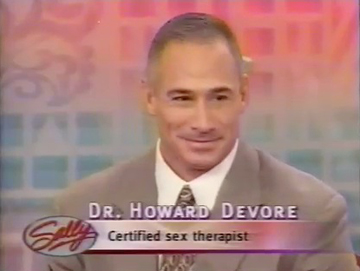
Dr. Tiger Howard Devore at Sally Jesse Raphael's Show in 1998
Carlos Motta: What it is to be intersex?
TD: What we call intersex people, are children that are born somewhere between male and female. The resting state of mammal tissue is female, so once a child is conceived, if nothing were to happen to that fetus it would be born with genitalia that looks female and that doesn’t matter from the standpoint of the chromosomes or anything else. What matters are the hormonal effects on the child. As it develops, the child moves basically from female to male in many steps and the genitals literally change how they look and function over the time of gestation. If there is a stopping in that masculinization, especially the external genitalia, then that child is noticed often at birth as being between the sexes or having ambiguous genitalia.
CM: What has traditionally been the procedure in terms of the medical establishment in relationship to intersex babies?
TD: When those children are born, they aren’t always identified as having intersex genitals at birth, because sometimes doctors just don’t notice and think the baby is female or male depending on what the assumption is. Sometimes those kids are raised for the first year or two in whatever sex they were assumed to be when they were born and later on something happens medically, hence we look closely at the child to discover they don’t have regular genitalia or that things aren’t functioning or moving along on the way that everybody thought they would. At that point the doctors and the experts are called in and they make sense of what they are going to do with this kid.
If the child is identified at birth, then surgery happens within the first year. The parents are told what the guessed-at sex of assignment is going to be, girl or boy, and then the child is set on this kind of treadmill of surgery and treatment to make that child as much of a boy, or as much of a girl as possible. Sometimes it doesn’t work out so well, and sometimes the kids rebel and they change sex in teenage or adulthood. In some cases they take their lives because they can’t handle the confusion and all the medicalization, and there is a whole set of outcomes that come along with that. 
Dr. Tiger Howard Devore at Dr. Oz's Show in 2010
Source: http://www.tigerhowarddevorephd.com/category/media
CM: What are the conditions that propel the medical establishment to function within this binary logic of wanting to modify or reassign the sex to either male or female? Why would it be a problem to just wait and see?
TD: This is what all of us who are born intersex are trying to get the medical establishment to do, to wait, to let the child make a determination about what their sex of identity is so that when they are three, four or five, they begin to tell you if they think they are a boy or girl and they show you by the kinds of ways that they pick toys, how they refer to themselves, or by the clothing they prefer. By the time they are eleven, twelve, thirteen, they make a decision about what kind of puberty they want to have. Do they want to have a feminizing puberty and end up looking like a girl, do they want to have a masculinizing puberty and end up looking like a boy or do they want something else? Do they want to have a puberty that is natural to their own personal physiology go with that? There are some kids who will identify as being neither male nor female and that is very difficult for parents and heterosexual people because they want their kid to be heterosexual too. They want their kid to be either male or female, to grow up like they did and to find an opposite sex partner, have children, a family and to have that kind of life, but that doesn’t always fit for an intersex person.
CM: Are you suggesting that parents think it is too much of a risk to wait and see as it pertains to sexual norms in society?
TD: It isn’t so much that it is too much of a risk. It is a great psychological challenge to be told you have to raise your child understanding that your child may tell you in a few years that it doesn’t feel like the sex that you think it is. It doesn’t fit the name that you have given it, it won’t wear the clothes you want it to wear, play with the toys you want it to play with. The child is going to have a different feeling about itself and it will tell you what those feelings are.
In order to preserve genital functioning and sensation, we are not going to do surgery, we are not going to give this kid hormones, we are not going to do anything that is going to change this kid until the kid has the chance to make that decision for itself: This is called “informed consent.” Instead of having something done to you without your knowledge, you get to tell about it, you get to find out in advance if you want to have treatment or surgery. But with little kids we don’t do that, especially concerning their genitals. 
Dr. Tiger Howard Devore at Oprah Winfrey's Show in 1984
Source: http://www.tigerhowarddevorephd.com/category/media
CM: What support or advocacy exists from the part of the intersex society in regards to raising a baby gender neutral for the first years?
TD: Very few parents are willing to do that in this society. Most parents want to have a provisional assignment of sex so the child can have a social identification without being stigmatized and teased too badly when entering the general society. I work with one woman who is home-schooling her kid so the kid can grow up without having the pressure of society to have to identify as male or female. That is a very rare parent. If we put this kid out in general society everybody is going to ask are you a boy or are you a girl? That kid doesn’t want to answer that question because it doesn’t really have an answer for that question until it is ready. Usually a child is ready pretty early and will tell you pretty quickly either by showing you or by telling you straight out.
Parents also have to be able to deal sometimes with a provisional assignment, which means they are going to dress this kid like a girl, they are going to call it a girl, knowing, it may tell them later it is a boy or it is a girl. We have to deal with supporting the family through what those choices look like as the child matures and faces puberty, as the child faces development of sexual identity.
CM: What are the different syndromes of intersex?
TD: There are many. The most common ones are “Congenital Adrenal Hyperplasia” (CAH) and that happens in female pattern. So usually it is XX chromosomes and those kids can be born with internal genitals that are female: They have the uterus with fallopian tubes and the inside of the vagina but they have what looks just like a penis except for the scrotal sacks are empty. Usually they have ovaries up in the abdomen so these kids will be raised male. They are told they are male and their puberties may be masculinizing but when they hit menstruation, they bleed once a month through their penis. I have had a few patients like that. They identify as male, they feel like males, they often do better with testosterone hormone replacement than estrogen hormone replacement and they often identify as heterosexual. Their penises work, but they don’t make sperm because they don’t have those kinds of gonads.
There is another syndrome called “Androgen Insensitivity” (AIS). These are people with male pattern XY chromosomes born with no sensitivity to androgens. Androgens are the hormones that make the baby look male and female. But all the tissues in their body don’t respond to androgen at all so they come out looking like female babies. They have the internal genitalia of men and a shallow vagina. The inside part of the vagina never develops, they have no uterus or fallopian tubes, and they are hairless except on their head because it takes androgens to make body hair. They often identify very strongly as women even though they have 46 XY male chromosomes. They often identify as heterosexual but they are infertile. Those are the two extremes. 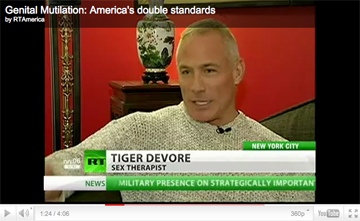
Dr. Tiger Howard Devore at RT in 2011
Source: http://www.tigerhowarddevorephd.com/category/media
If you look at this from the stand point of the chromosomes, there are people out there with 47 instead of 46 chromosomes so in every cell, their sex chromosomes are XXY, male and female in one cell, and these people are born with what looks like a full penis outside, but it is infantile in size and at puberty doesn’t grow a lot because they don’t have the hormones for that to happen. They tend to have female fat distribution. They are a little curvier sometimes developing breasts because they don’t have a lot of virilizing hormones. The long bones and the legs and arms don’t grow normally, getting too long because it takes male hormones to close off the ends of those bones so they stop growing. They can be very tall people, but they identify kind of between the sexes. A lot of them identify as male, some identify as in-between and a rare group identify as female.
There are several other syndromes that fit between these extremes like “Hypospadias,” which is usually an XY kind of birth difference that results in ambiguous genitalia. It is probably the most common congenital difference in our species and it happens more often than anything else in the birthing suite, but we still don’t really know how to deal with it when it happens. What we conventionally tell parents is that “Hypospadias” is easily repaired and can be done quickly, before the child will ever know about it. Parents are promised one or two surgeries that can result in more than twenty surgeries over time. This has improved over time but we are still cutting into flesh and stitching it up with something, either silk or something that dissolves, so as much as the techniques have improved, we are still cutting into fresh flesh with steel and that means scarring. That means you can’t tell exactly how it is going to heal and that it will not be as flexible as regular skin. That also means it will not have blood supply or nervous feeling, so you really have to consider this when you are telling parents you are just going to cut the skin up a little bit and the child will be fine. You can’t really promise that.
CM: That is physical scarring, but I also imagine it is emotional scarring.
TD: The doctors will tell you the kids are too young to remember. If they are younger than one, typically they will not remember but many kids have terrible traumatic memories of what it was like to be in the hospital; they often report this in therapy. Of course parents don’t want to talk about it, it is a scary thing to admit to, parents have no preparation for how to deal with their children’s memories of having been abandoned by them in a scary place where they got hurt by people who they didn’t know. That is the way the kid remembers it that this really scary thing happened to them, when their parents left them in this big building, where they got hurt really badly. 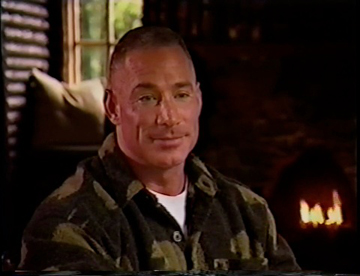
Dr. Tiger Howard Devore at Discovery Channel in 2001
Source: http://www.tigerhowarddevorephd.com/category/media
CM: What is the historical trajectory of intersex people as they become subjects of medical practice and how has this changed historically?
TD: We see from reviewing history that intersex people have always been medical subjects. Every society that records intersex people as part of their birth population has different traditions and ways of dealing with intersex people. When we are looking at war-like societies that have to raise warriors and breeding females, such as Spartan and Apache societies, the kid is thrown off a cliff or left on a hillside to die because they decide it will not be a warrior and cannot be a mother: The child is destroyed right after birth. In other societies that are more agrarian, there tends to be a spiritual element, like the Zunis and more ancient East Indian societies, such as New Guinea of Papua New Guinea’s indigenous peoples. They have a whole set of traditions where they raise these people to be shamans, healers, and spiritual teachers. They are given a special place because they are special looking and different from the men and women who have assigned roles. They are given a privileged position. In other societies, these people are given the chance to be high status females more or less. They are identified as something between male and female, given a more female role, but are in charge of all the females in their family group. This is true in the South Pacific and in other Pacific islands. You see different things in different cultures and the history is really pretty interesting.
CM: It seems like the most common association with intersexuality is the mythical figure of the hermaphrodite. Is that the image that has permeated the way that we understand this condition to be? How does the intersex society today relate to this somewhat archaic image?
TD: That image is inaccurate. There is no baby that is ever going to be born with half male and half female genitals. There is only one set of cells that it is either going to develop into male or female or something in between. You are not going to get a kid with both things because you don’t have those kinds of cells in the embryo. The myth is literally something that is not possible. There are very rare individuals that have a breast on one side, a flat chest on the other side, an ovary on one side, a testis on the other side, where they do look split in the middle, but they have ambiguous genitalia, they don’t have a penis on one side and a vagina on the other. Those rare individuals that you will see kind of in Side Shows, circuses and other places where people are on display as freaks of human nature. Those people are seen as the evidence for that ancient mythology around the union of Hermes and Aphrodite. 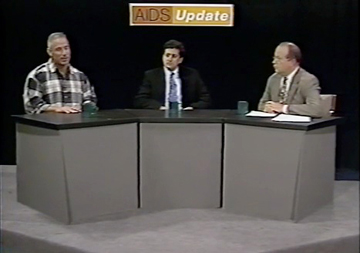
Dr. Tiger Howard Devore at SF Public Access in 1999
Source: http://www.tigerhowarddevorephd.com/category/media
CM: If we come back to the idea of allowing the body of a baby that is born intersex to develop, is it as simple as that? Is there no need for medical treatment? I suppose it depends on the specific syndrome, but can somebody simply wait and not have to go through the medical establishment up to a point in which a decision can be made?
TD: The simple answer is yes, there are a few medically necessary considerations around kids who are born with hormonal imbalance that causes them to waste all the salt out of their system. They would die rapidly if they didn’t get hormonal intervention. That is one type. Almost all the rest of the intersex kids that we force changes on, it is all cosmetic and not one doctor is going to tell you it is medically necessary, except for the discomfort of the parents for how the kid is going to be accepted into society. The idea is to fix this kid up so they look “right,” but medical considerations from the standpoint of just the health of the child, there are only a few very specific considerations that we can find out pretty quick and treat relatively easily. All the rest of it is about how we think these kids are supposed to look so that everybody else is comfortable.
CM: How do you respond to this, if I may call it so, moral authority of the medical establishment, when it is not supposed to be concerned with moral issues?
TD: Hundreds of thousands of adults will write to their previous treating physicians, medical colleges and places where nurses and birthing suite employees and all these people are trained to say this bad thing happened to them. They say: “It didn’t work, you should stop doing this and that it is a big mistake.” Because these medical professionals thought these kids were fixed and they were done with them, they never checked on them as adults. When they do check on them as adults, they can’t find them because they committed suicide, or they are murderously angry a lot of the time. Some intersex people seem to not really notice and want to hide out and not even be known as having ever been intersex. That is a percentage of the population. But a very large vocal group is saying: “We were cut on, we were scarred, we were made into something that doesn’t fit for who we are, it was unfair to do that to us, and you shouldn’t do that to kids now.”
CM: It seems to me we live in a society that, I would even claim as an international standard, is completely gender-variant phobic and whatever doesn’t fit the binary logic is excluded. And often this exclusion is seen as a minor thing.
TD: Well also they try to eliminate it. They do the best they can to make it go away. 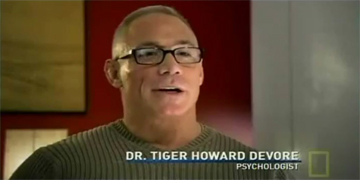
Dr. Tiger Howard Devore at National Geographic in 2010
Source: http://www.tigerhowarddevorephd.com/category/media
CM: If we continue with the scenario of the baby that waits to make a decision about gender until later on, what is the fate of this baby in a society that is completely phobic to this type of difference and how can you tackle those issues being confronted from childhood?
TD: The child that gets to make all these decisions has the chance to be able to find out where is it easiest to be accepted, where societies are that do allow for a third gender and where the laws really favor intersex people. They will find out things like that the Constitutional Court in Colombia in South America made a blanket decision making genital surgeries on infants against the law. If doctors do that, they lose their medical license. We are looking for more laws like that.
When the U.S. Congress condemned female circumcision done by Muslim clerics in order to change the nature of sexuality of females within their group, men in Congress thought this terrible thing should be stopped right away, but when we pointed out to them this happens everyday to American-born kids who don’t really need it and that we are doing it because we want to change how they look just like the Muslim clerics, the U.S. Congress didn’t want to hear it and they didn’t want to see the direct association between those two forms of logic. There is the hypocrisy coming right out of this heteronormative subjugation of females.
When we wait for kids to grow up and make this decision, they can choose to dress as male, female or mixed. If they choose to dress mixed, then they find places where that is acceptable, like New York City, San Francisco and plenty of other places where mostly as teenagers and young adults, it is okay to dress in a mixed fashion, so they settle into whatever kind of style they want to make their own. They will find their way on the basis of all the Internet-based international organizations that give advice about different possibilities for living, associating with and having the support of these kinds of groups. For families there are many psychologists and therapists who can help make this adjustment easier on the kid and the family. They can teach you how you don’t have to reject your own child, as they become a young adult and make the choice not to be something that everybody thinks is normal. 
INSA's logo from their homepage, http://www.isna.org
CM: Can you speak to me about political organizing by intersex people in the United States? How has it come to be? What types of organizations have been formed and what lobbying has been done?
TD: Naturally the medical establishment wants to refer to us as trouble makers, as activists and people who do more harm than good by making it harder for them to do good work and for young kids to get access to the treatment they say is needed. Of course this is what you would expect for the establishment to say.
We send people to find support groups first: the Intersex Society of North America, Androgen Insensitivity groups, CAH groups or any of the groups around the world that have organized, offer support to one another. There are also trans family associations and trans family unity groups offering similar services to kids who identify differently from the sex they were born in, even though they don’t have ambiguous genitalia and even though they don’t have differences in their chromosomes or hormones that our science is able to detect at this time in our scientific development. My guess is that with trans kids, we are going to know what causes it later; we are just not smart enough to know it now.
Either way, there are many of these support groups all over the world and you can find them on the Internet. This is where we send anxious parents, teenagers and adults that are isolated and never had relationships, that have been hiding in jobs where they don’t have to meet other people for years. Some of these people become part of the groups that lobby the American Academy of Pediatrics or the American Medical Association, or that speak to congress members about changing laws to include standards of care and informed consent as the law for little kids and infants. These are the kinds of things that are happening right now.
CM: Has there been any legislative resolution to any of the lobbying strategies you are mentioning?
TD: Outside of the big win in Colombia, not that I can point at right now. In the early part of the new century, The American Academy of Pediatrics released a paper statement about how people should treat intersex kids, but you have to become a lawyer to understand the difference between should and must. Should means we think you ought to wait and be sure about surgery but you can do whatever you like. Must means you must wait and be sure about surgery or risk losing your license or being sued by parents who are later dissatisfied with the fact they have a kid who was made into a little girl, while saying all along “I’m a boy, I want to be a boy, I want my penis, I want my penis back, I want a new penis!” They want to wear short hair, they won’t have long hair, they won’t wear dresses, they won’t play with dolls, you know that is a mistake somebody made because they didn’t look at all facts, and the facts are known. I appreciate the American Academy of Pediatrics stating you “should” wait, but what resulted were health care practitioners continuing to do what they were taught in medical school. No change occurred that I am aware of. 
Dr. Tiger Howard Devore at People Are Talking with Nancy Merrill
Source: http://www.tigerhowarddevorephd.com/category/media
CM: There hasn’t been any, not even a hint of interest from the United States Congress or government on this issue?
TD: No. Actually when the hypocrisy of the female circumcision condemnation came out in Congress and we wanted to question why in a discussion about genital surgery on kids Congress would be willing to end this surgery for Muslim kids in Saudi Arabia but not for American kids in every American city in this country, we ran into a debate about religious traditions behind circumcision and were told Congress couldn’t issue a blanket statement making it illegal to do genital surgery on infants without their consent because what do we do about circumcision? For me, the answer isn’t that hard, circumcision continues in the way it is been done for thousands and thousands of years, by somebody who is part of that religious organization. Every doctor in every hospital doesn’t circumcise every male child that is born, it is easy, but they make it hard.
CM: I am from Colombia and followed these regulations. The advancement of this law was different in Colombia because it was the Constitutional Court, not the congress that oversaw it. If that law project had gone through Congress, which is an incredibly Catholic institution, it would have never passed. But the Constitutional Court is more open-minded. In fact there is a lawsuit right now, I think they have to resolve in the next week, on whether to accept gay marriage.
Being intersex has technically nothing to do with sexual orientation, yet there seems to be proximity between the intersex community and LGB organizations. Can you speak about this? Why are the ‘T’ and the ‘I’ associated to these communities and political organizations? Has this alliance served politically for the intersex society?
TD: That is a couple of big questions. Sociologically the gay and lesbian community has for a very long time, or actually I should say the artist community has for a very long time been the place for people who are sexually different go to. These people identify as being counter culture and that is why I talk about the people who I see as being sexually different as being different than the mainstream. Whenever people who are different are looking for a place where they will be accepted, as opposed to receiving prejudice, being kept down, refused privilege, or kept from being able to advance in the things that are most important to them, they go to these fringe communities. Lesbians and gays have won a lot of recognition in Western society. We are at a place where lesbians and gays really have a political force. Queer others and sexually different others do get some value out of associating themselves with these groups. The lesbian and gay communities have been pretty wiling to accept people who are sexually different like the heterosexual sadomasochistic types and all the rest of the people who express sexuality in a different way. Those who cross gender behavior from the standpoint of what the mainstream sees as the sexual binary almost always gravitate toward the gay and lesbian subcultures and communities. There is some power in that, in numbers; and political organizations that are already established, and have their in-roads to various powers-to-be as well as with corporations have the money to support political pursuits.
Is that a good or a bad thing? I can’t really be sure. Regarding sexuality, because I do identify as intersex, then homosexuality is the bad thing right? We don’t want to be homosexual, but if I am intersexed when is it that I am homosexual? Am I homosexual when I sleep with a male partner because I happen to look male, or am I homosexual if I sleep with a female partner because I am really intersexed? Am I only homosexual when I sleep with another intersexed person, and how do we define that? How do we make sure it is really an intersexed person so we can be sure I am really homosexual? From the standpoint of the gay and lesbian movement, are intersexed people just more homosexuals jumping on the bandwagon? Well no, it is kind of hard given our very strict definitions that are completely gender biased and binary. What is the sexuality of the intersexed person? What if they don’t identify as male or female? You know we all get to look at these definitional questions when we try to make sense of how we are going to arrange our prejudices. 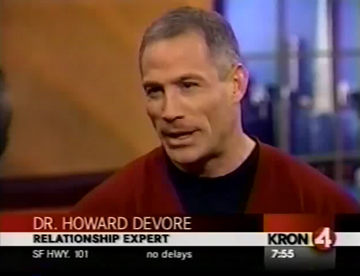
Dr. Tiger Howard Devore at UPN-Kron TV
Source: http://www.tigerhowarddevorephd.com/category/media
CM: Those are really interesting questions. You are suggesting that sexuality along these lines is culturally constructed?
TD: Absolutely. I don’t suggest it: That is clearly the truth of it. It is one of those things we made up and we want to believe it.
CM: What is the cultural representation of the intersex today in the United States and how do organizations you are associated with tackle issues of representation?
TD: There is of course within any group varying differences, so there are some of us like me who feel that intersex is an accurate term between the sexes that represents the way we want to be able to knock down the binary. It isn’t just one, it isn’t just this or that, it is all this and between. We are the intersex people, the ones who are in between. That makes sense to me if you look at pulling apart that word and making sense of its etymology. For me, intersex is better than hermaphrodite because hermaphrodite doesn’t exist, it isn’t real. Some people thought intersex had meanings they didn’t want to be associated with so they chose another naming, Disorder Sexual Development (DSD). Many people out there stopped using intersex and now claim they have a disorder of sexual development. It makes this more scientific. It also makes it more medical and I am afraid more treatable as a result. I am afraid that it makes it more of a stigma. I prefer to have an identity as an intersex person than an identity as a disordered person.
CM: A trans activist I interviewed in Norway, Esben Esther Pirelli Benestad, doesn’t like the disorder categorization either and talks about being trans having a “talent” that needs to be enacted and performed.
TD: Right, beautifully said. That’s part of the other thing I want to respond to regarding cultural representation. I am intersex, but I made a choice very young. I pass as male really well. I keep my hair really short and keep my body muscular and lean. I have this big square jaw, grow hair on my face, and I am a doctor. I get a lot of cultural privileges for being a white male doctor who is in good shape with a hyper-masculine appearance, and all the other stuff that goes along with how I dress everyday. That is all a choice, and I get something from making that choice so I act this male gender stuff really well and it is kind of fun. I know it is a joke right?
CM: How is it a joke?
TD: Well it is not true. Like your friend says it is a “talent.” I get to dress up like this, I get to cut my hair like this, I get to exercise to keep my body like this, and I do so because of the effect that it has on everyone who looks at, or meets me or sees me in media. When somebody has seen me on some TV show or something and I say I am not male, they look at this image and they think: “That is not male?” They have to make some sense of that and they ask questions of themselves like: “Well, what does that mean if that is not male? I don’t look anything like that; I am supposed to be a real man, what do I do now? If I can’t measure up to that appearance and he is not male, and I am, what does that mean?
CM: But here is a tricky question: You say it is not true, but in your appearance it is self evident that it is true, that you are a hyper masculine intersex person, but wouldn't that be reducing the idea of what gender is to a kind of biological statement? In other words, you are intersex in terms of your biological make-up but you are a male in the way that you are presenting yourself to the world.
TD: It is a cultural construction that is about what we want to believe through our eyes, how we make things look. We have agreed that this appearance is masculine, gender is masculine, and sex is male right?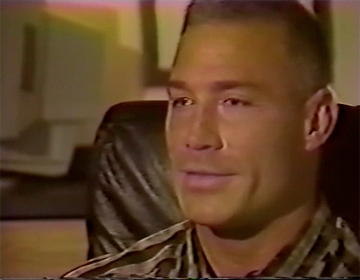
Dr. Tiger Howard Devore at UPN-Kron TV, 1999
Source: http://www.tigerhowarddevorephd.com/category/media
CM: But when you say it is not true, what would be true?
TD: True for me would be a nice intersex presentation. I would wear softer clothes. I wouldn’t have to be this heavily muscled or have to act out all the typical male stuff in order to have power. Wouldn’t that be great? But the fact is I get a better chance if I act out all the heavy male stuff; that is the truth. I dare anybody to refute that!
CM: I wouldn’t. It seems like you are an incredibly self-confident and assertive political person. But not all of us are like this. What are the alternatives and choices intersex kids can make when they are growing up in order to have a life that is dignified, and not one of rejection and discrimination?
TD: There is no way any of us can make choices to lead a life where we are not rejected and discriminated against. I don’t care how privileged you are, you are still going to expect to have some rejections and limitations so we can’t eliminate that. We can make individual choices about how far we want to go in politicizing our statement. I haven’t always been so wiling to adhere to these heteronormative gender appearances. As I got more power as a result of my education, my degree, my experience, the institutions I became associated with, it was much safer for me to come out and say the things that I am saying to you today. Previous to my having the backing of those institutions, all those degrees, all those years of studying, all the expertise, I could have been doing myself a lot of harm by saying this stuff, but because I did the work to have this position of power, I can defend myself much more effectively than other people who don’t have these privileges, they take a lot more risk. If I want to go out into the job world and represent myself as somebody who is available to become an executive in a corporation, and they saw me on TV saying I am not a man, it would be hard to get hired. I have to balance that. I chose a life where I am in charge of my office, work for myself and see my own clients. They come to me, and thank goodness they pay me enough to be able to pay for my life.
If I didn’t do that in this society I could be in deep trouble for saying the things that I say. I think we have to be careful about our choices about representing ourselves in a very public way depending upon the kind of success we want to have. I think people like me and people who are gender outrageous, politically rebellious and radical in their gender presentation, I applaud them, I need them to be out on the street, to be organizing as long as they can afford to do it, I need them to find lines where they can continue to do gender politics with their physical appearance and outspoken views. I know at one point not all of them are going to be able to find a way to make a living where they can maintain that identity and appearance and many have to tone that down in order to be able to survive economically in this society, and that is too bad. What I’m hoping is that enough of this kind of work will make it possible for those people to be acceptable in the work place. We still can’t gender appearance to be included in the anti-discrimination laws; Congress won’t do it in this country. I have been working for years with GPAC to make that happen. They will take out sexual orientation, but they won’t take out gender different appearance. We are hoping that will happen, but it hasn’t happened yet. 
Detail from Dr. Devore's Ask Tiger section on his website
http://www.tigerhowarddevorephd.com/category/ask-tiger/
CM: Is the intersex society working together with transgender groups; because it seems in the way that you are speaking about this in terms of presentation that it is much closer to gender identity disorders than it is to sexual orientation issues?
TD: As you know, gender identity disorder as a term is about to be thrown out, that was going to go away because the scientists had said like homosexuality, in a way in 1973, so our terminology is going to be changing. Nevertheless, there are people who are intersex who don’t want to be called transsexual. That is a bad word to them, and they don’t like that association.
CM: How do you feel about it yourself?
TD: Again, I think there is strength in numbers. I think we are fighting for many of the same things and are stupid not to associate. I think we need to be able to bring the rights of gender and sexually different people forward and I don’t care if you identity as intersex or trans sex or queer or gender different. I think as a group we need to be able to work together, bring our money and organizations together to make this change happen within a larger society. As long as we are jealous and fight about turf, within this kind of a movement, it is going to be very hard for progress to occur.
CM: One of the motivations for me to work on this project, which is titled We Who Feel Differently, is the desire to come back to the idea of difference and not continue asserting ideas of (assimilationist) equality. This is because I have privileges, because of my upbringing and because I am also a homosexual man, which is highly more acceptable than any other forms of sexual orientation or gender identity, but it is also because at the same time I do want to live a different life and I am completely opposed to the way that the gay and lesbian movement is shaping my representation. Can you speak to me about this idea of difference? How do you feel about it?
TD: We are gender different: we are not equal. I don’t want to be like heterosexuals ever. That is the last thing; otherwise I would have been a heterosexual... like I had a choice! I don’t want to have the rights that heterosexuals have, I want to have the rights that other human beings have. We are different, but we are not different meaning that we should be subjugated, separated, destroyed, discriminated against or the objects of prejudice, none of that. We are good human beings and rights have to be extended to all human beings, not just heterosexuals.
I need this to be seen as you just said it. We are different, we are going to be different, we are going to look different, we are going to feel differently, we are going to sound different, we are going to speak differently, we are going to have different activities on the weekends. When we get together in the corporate coffee lounge, we are going to talk about different stuff than our heterosexual work mates who have kids in school, unless we have kids too. The fact is that that difference is never going to go away. Saying that we are equal or that we are the same is silly. It is not going to happen that way. Marriage equality is one of those places where I get really caught up because I am very concerned about the nature of both of those terms. I am not so sure that marriage is so great for heterosexuals, let alone for everybody else and I don’t think that equality is really what we are looking for there. I think what we are looking for is equal access to the privileges and laws that people who are married get, that is what we really want. The rest of it has nothing to do with identity, nothing to do with gender, nothing to do with biology, nothing to do with science; it just has to do with taxes.
Detail from Dr. Devore's website
CM: Throughout some of these conversations that I have been having with, especially with leaders of the gay and lesbian movements in the organizations in different places, one of the counter arguments to what you just said is that most gay and lesbian people want to have “normal lives.” They want to live in the suburbs, have a family, be able to marry, and so on. Are you and I, a minority in that regard? Do you and I want to be different from everybody else or do you find this to be a just a political position on the part of these people?
TD: I have been listening to certain very well known leaders for a long time talking about how we are just like heterosexuals and it is not true. How many gay couples do you know that live in the suburbs and want children and go to the local country club? I don’t know a lot of those. I think gay people like to be around other gay people. I don’t see a massive exodus of all gay people from city and cultural centers where they tend to put themselves because a lot of gay people have real interest in culture as they see how they do and don’t fit into culture. I don’t see us all making some kind of mass move out to the suburbs. I don’t see that happening this century or next century. I think it is a specious argument. It sounds good, but it is not right, it may sell, but it is not the way things are going to happen.
CM: Is there anything I haven’t asked or brought up that is important and you would like to address?
TD: Interviewers have often made statements about how reducing the binary orientation towards sexuality will lead to a sexless or genderless society that will be some kind of advancement within human culture and development that will change everything making us all into equals so that we won’t regard ourselves as male or female and won’t see ourselves as having hierarchy or power on that basis. I think there is an interesting utopian idea behind that but as I said just a few minutes ago, I don’t think we are moving toward a great leavening, I don’t think we are moving toward a great sameness here. I think we are really going to learn to celebrate difference in all of its forms as opposed to making sense of how it is that we can separate and discriminate against difference over time. I don’t see difference reducing. I see difference increasing and being given space to be expressed as opposed to suppressed and eliminated.
Weblink: Dr. Tiger Howard Devore, PhD
↑Top
